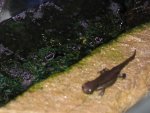davidpgregory
New member
- Joined
- May 2, 2011
- Messages
- 5
- Reaction score
- 0
- Points
- 0
- Country
- United States
I am seeking advice from members who may have had similar experiences , or insight into a problem I am having with my beloved Fire Bellied Newt, Baby. He was once the youngest newt in my tank, hence the name. He has outlived all of his original tank-mates, by many years, and has without question led a happy, pampered life. That being said, he has been with us for so long (about 17 years) that he has become a true part of the family, and once I read that newts could live for up to 30 years, I became committed to helping him enjoy as many more years as possible. I understand that is an abnormally long life for a captive newt, and I am proud to have cared for him so well that he has kept us company for so long. He lives in a 55 gallon tank that has about 25 gallons of pre-filtered and stabilized water circulating through a Penn Plax Cascade filter rated for up to 100 gallons. The tank has a central reef constructed of stone which rises above the surface of the water to create a land mass including many newt-sized nooks and crannies, both above and below the water level. Baby shares his home with a small frog and a small fish, as well as a large population of snails which spontaneously grew out of nowhere. They have been living together harmoniously for years, and an inspection of Baby's body reveals no injuries or ulcers of any kind. Years ago, when I was able to find them, Baby enjoyed a diet of live blood worms, but for many years he has been settling for frozen since that is all I can find. He will occasionally surprise me by gobbling up a stray frog feed pellet, but for the most part is into the blood worms. I have tried feeding him brine shrimp in the past for variety, but he is not enthusiastic about them. I offer him a pinch of thawed blood worms almost every evening, and more often than not, he aggressively eats them off my fingertip, sometimes scraping my skin with his tiny teeth in the process. There have been many times in the past when he has gone a few days without any interest in eating, so initially I was not overly concerned when he stopped eating, but now it has been 11 days and I am scared. I have offered him blood worms, brine shrimp, moistened frog pellets, and very small earthworms, at various times of day, with lights on, and with lights off, on my finger, on a skewer, in a pile on his rock, in any and every way I can think of. One of the earthworms literally rubbed itself on his mouth, so I don't suspect a vision or olfactory failure of preventing him from detecting his food. He is just not interested in eating. I tested my water of course, and there is no measurable ammonia present. The ph was low, and I have been slowly raising it by adding ph-up and re-testing. Truthfully I don't believe the ph is a significant factor, as it has fluctuated in the past without consequence, and my frog is swimming around like crazy and gobbling his food without a care. Typically Baby spends the majority of his time on land, but takes an occasional swim around the tank which he navigates surely and athletically. He has always been nimble and fairly quick, even on land, but for the past week or 2, he has been sluggish. He moves around, but not much, and not fast, and his typical rhythmic throat bulge appears to be more of a tremor at times. He actually seems to shake a little sometimes. I have not seen him swim, but he keeps moist by standing in the mist from the filter discharge. I am hopeful that my boy will greedily snap a wad of worms off my finger the next time I offer them, but would greatly appreciate any advice on how to encourage him to eat. I know he is not young, and that maybe he is just tired, but I don't want to give up on him prematurely. If there is anything more I can do to help him bounce back, or just to be more comfortable, I want to do all I can. I am sorry this entry was so long, but I did not want to leave out anything that might help diagnose, or eliminate potential causes. Thank you for taking the time to read this, and thank you in advance for any advice or guidance you can offer.



